
Cream soda
A ton of research suggests limiting sugar-sweetened beverages, which are pretty much the ultimate example of zero nutrition. In fact, U.S. Dietary Guidelines suggest there’s strong evidence these beverages contribute to excess weight and type 2 diabetes risk in adults and children. Surprisingly, some choices in this category are better than others. Ginger ale has 22 grams of sugar per can versus 49 grams in the same amount of cream soda, according to the USDA Food Database. But it might be better to just cut this category of drinks from your diet. For more evidence, here are 10 reasons to avoid all soda.
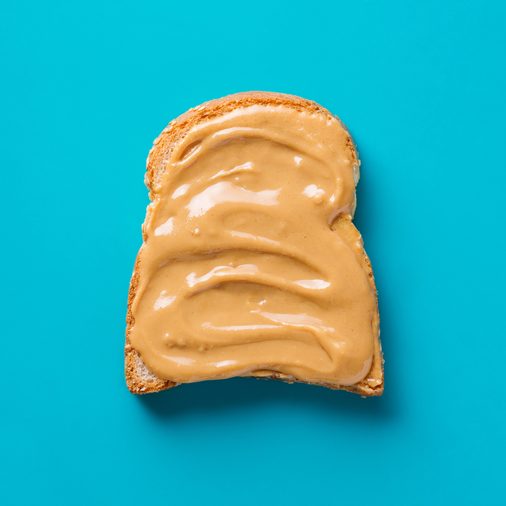
Low-fat peanut butter
Amy Gorin, MS, RDN, owner of Amy Gorin Nutrition, recommends ditching low-fat versions of the nutty spread. “Peanut butter offers fats that are filling and heart-healthy. But when that fat is removed or reduced, extra sugar and other filler ingredients are often added. When you’re shopping for peanut butter, read the ingredients label and pick one that contains only roasted peanuts.” Or try a different nut butter: here’s what you should know about almond butter vs. peanut butter.
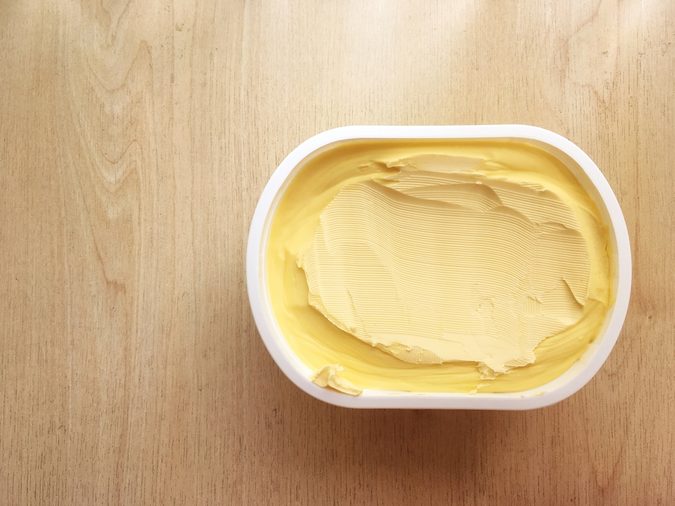
Margarine
Gorin says “margarine has been considered a healthy alternative to butter, but many versions still contain partially hydrogenated oil—an ingredient that contains trans fats, which are harmful.” (The Food and Drug Administration has placed restrictions on the use of trans fats in food, but they aren’t completely out of the food supply yet.) “They can heighten your ‘bad’ LDL cholesterol, decrease your beneficial HDL cholesterol, and heighten your risk of heart disease,” says Gorin. Instead of margarine, consider using a small amount of a heart-healthy oil, such as extra-virgin olive oil. But be mindful of cooking with oil at high temperatures. Check out our guide to the healthiest oils you can cook with.
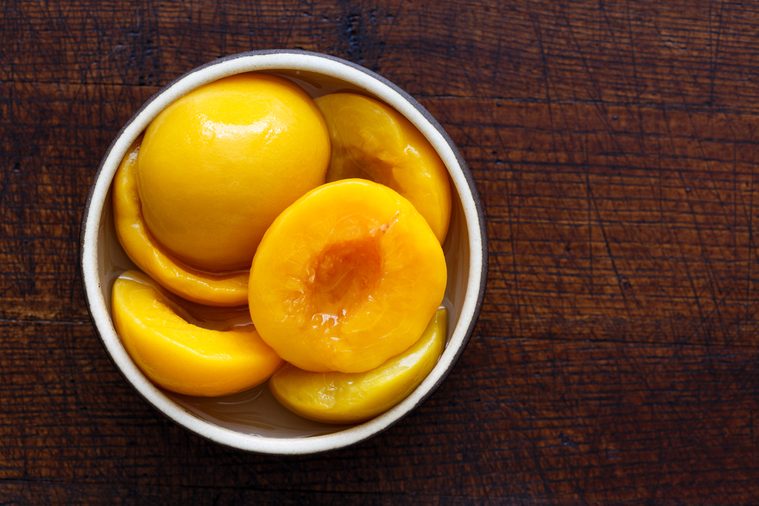
Fruit canned in syrup
Fresh fruit is an important component of a healthy diet, but how it’s prepared matters. “You might think that canned fruit is as healthy as fresh, but if the label shows that it’s canned in ‘light syrup’ or ‘heavy syrup,’ it means that the fruit has sugar added to it,” Gorin says. “You want to limit the added sugar that you eat.” She suggests reading your food’s ingredients label to make sure it contains nothing but fruit. “Fruit canned in juice or water is usually a safe option,” Gorin adds. These are the most filling fruits and veggies you can eat, according to nutritionists.
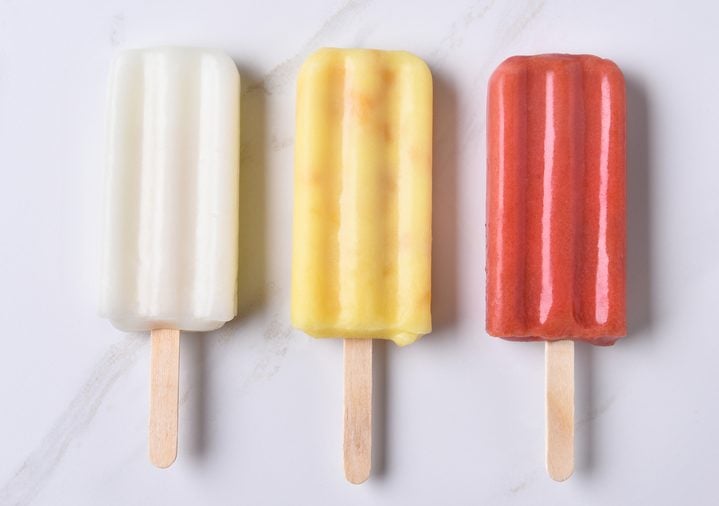
Ice pops
When summer rolls around, ice pops and fruit-flavored shaved ice may seem like a healthy, refreshing treat. But one quick glance at the ingredients might change your mind. Most are made of sugar, sugar, and more sugar with artificial flavors, preservatives, and colors. We already know added sugar is a problem, but an article in the Journal Neurotherapeutics suggests artificial colors are also a public health problem and have been linked with behavioral issues in children. Choose pops that are made primarily with juice, so that you’re getting some nutrition for your calories. Don’t miss things parents should do to prevent summer weight gain in kids.

Cotton candy
According to the USDA Food Database, cotton candy is 100 percent sugar. A one-ounce serving averages 110 calories and 28 grams sugar. This melt-in-your-mouth treat may seem “light” but it isn’t, and the effect on your teeth isn’t pretty either. The most recent available World Health Organization guidelines recommend added sugar make up no more than 10 percent of calories to reduce incidence of cavities and gum disease. That’s equivalent to about 38 grams of sugar for someone eating 1,500 calories a day. Given this, a single ounce of cotton candy contributes 73 percent of the recommended daily limit. Gum disease can be a sign of a more serious health condition; here are 7 signs of disease your teeth can reveal.
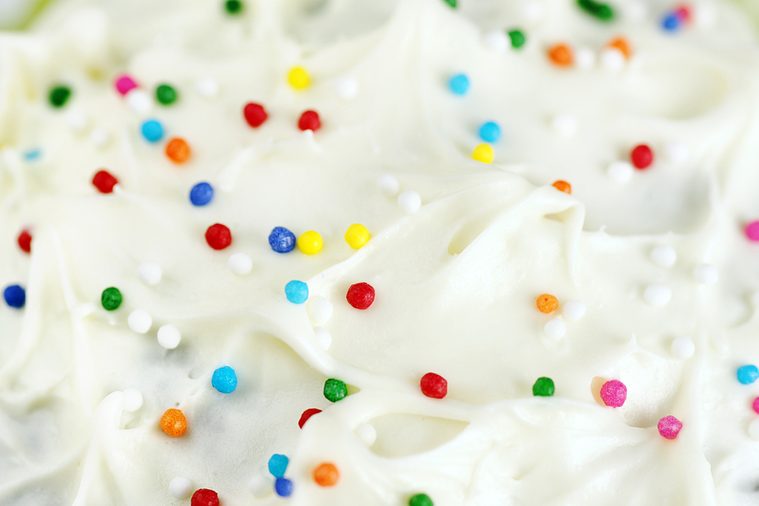
Frosting
That creamy delicious chocolate topping on your cake clocks in at around 140 calories with 18 to 19 grams of added sugar and about 2 grams of saturated fat in just 2 tablespoons, according to the US Food Database. You’ll find a host of other questionable ingredients including hydrogenated fats, a source of trans fat that are bad for your heart, according to the American Heart Association. At less than 0.5 grams per serving, trans fat doesn’t have to be declared on a label according to the FDA, so you won’t know it’s there—and let’s face it, you’re likely to eat more than two spoonfuls. Go for light whipped cream instead. It’s literally half the calories. Check out the healthy desserts that can help you lose weight.

Coffee drinks
NYC-based dietitian Natalie Rizzo, MS, RD, says some of the emptiest calories you can take in are found in sugary blended coffee drinks, like frappuccinos or caramel macchiatos. “To me, these drinks masquerade as a caffeine pick-me-up, but are more like a dessert. I absolutely think it’s OK to indulge occasionally but making these your go-to drink at the coffee shop is definitely not a good choice,” she says. “Sugar-sweetened coffee drinks can have more sugar, fat, and calories than most meals!” These calorie-free coffee hacks might just replace your Starbucks habit.
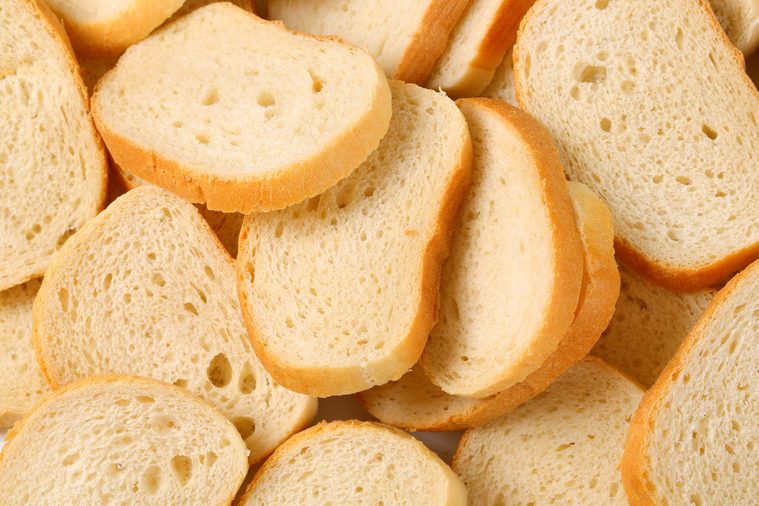
White bread
Your standard slice of white bread has little nutrition. According to the USDA Food Database, a slice has about 150 calories and is lower in fiber due to stripped down whole grain. White bread has a laundry list of ingredients, many of which are unrecognizable to the average consumer. Two ingredients you know to avoid, however: high fructose corn syrup and added sugar, both of which have been linked to increased incidence of diabetes, according to the Journal Global Public Health. Use these smart swaps to eat more healthy carbs.
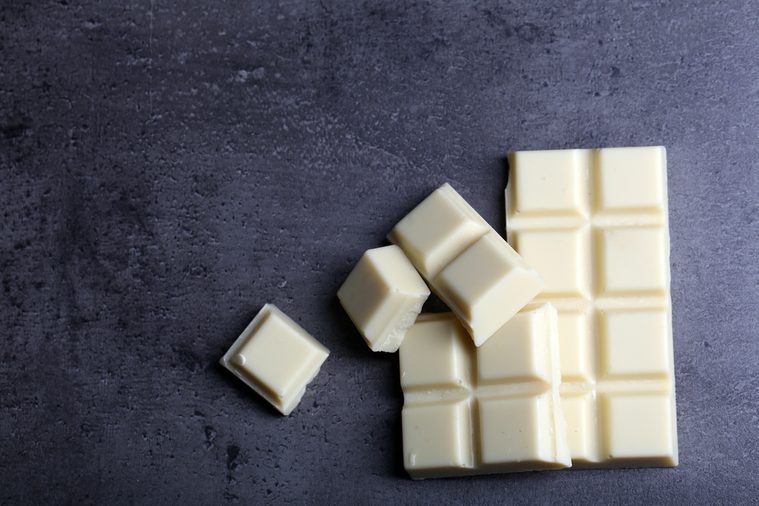
White chocolate
All the health benefits related to chocolate don’t apply here. Primarily made up of cocoa butter, milk, or cream, flavors and emulsifying agents, as indicated in the FDA Code of Federal Regulations, white chocolate has around 150 calories, 5 grams saturated fat, and 16.5 grams of sugar per ounce according to the USDA Food Database. Unlike dark and milk chocolate, which contain varying amounts of the more antioxidant-rich cocoa, white chocolate contains zero cocoa. Choose dark chocolate for greater nutritional benefits, according to an article in the Journal Antioxidant and Redox. These are the health benefits of chocolate you need to know.
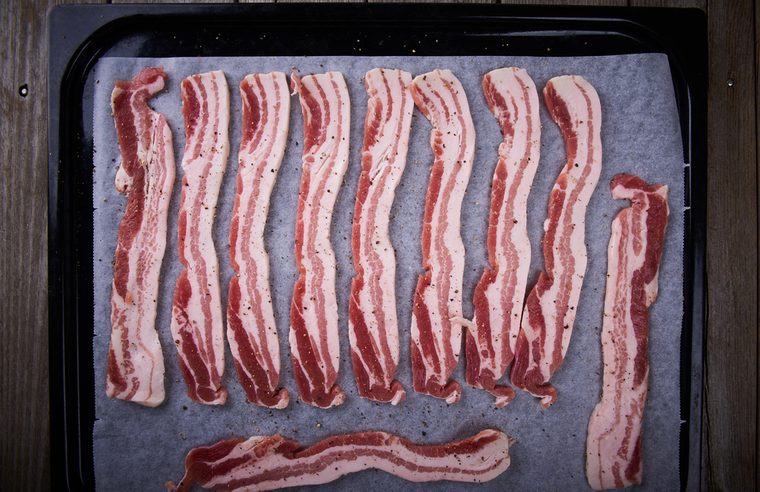
Salt pork
A saturated-fat-and-salt bomb, 4 ounces of raw salt pork has 33 grams of saturated fat and over 3,000 milligrams of sodium, according to the USDA Food Database. Thankfully it is mainly used in relatively small amounts as a flavor enhancer in cooking, for example in baked beans or collard greens in traditional Southern cooking. Still, it’s best not to make salt pork a daily habit. Watch out for these other 13 surprisingly high-sodium foods.
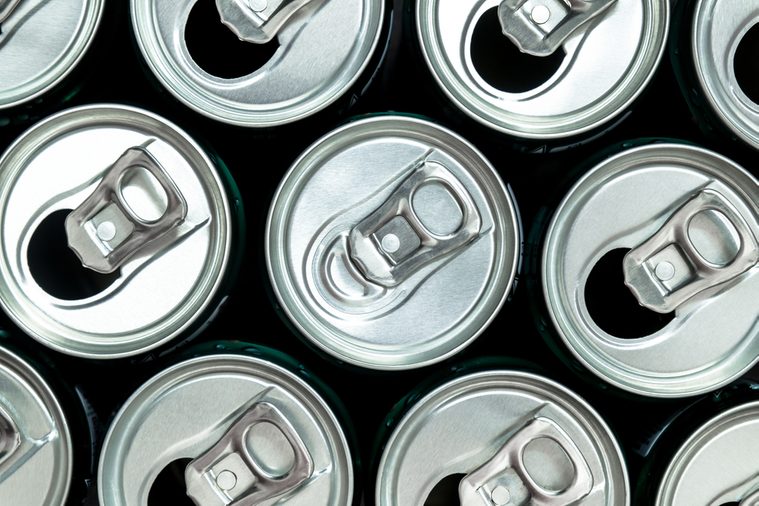
Energy drinks
“Flashy packaging and celebrity endorsements draw adolescents and young adults to energy drinks,” says Toby Amidor, MS, RD, Wall Street Journal bestselling author of The Easy 5-Ingredient Healthy Cookbook. Amidor cautions that “energy drinks are sold as a dietary supplement, which means they aren’t subject to the same safety standards as foods and drinks.” What’s more, they contain ingredients such as caffeine—which can increase heart rate, trigger anxiety, and lead to upset stomach—and Guarana, a caffeine-like stimulant. Your healthier choice: natural energy drink recipes you can make at home.
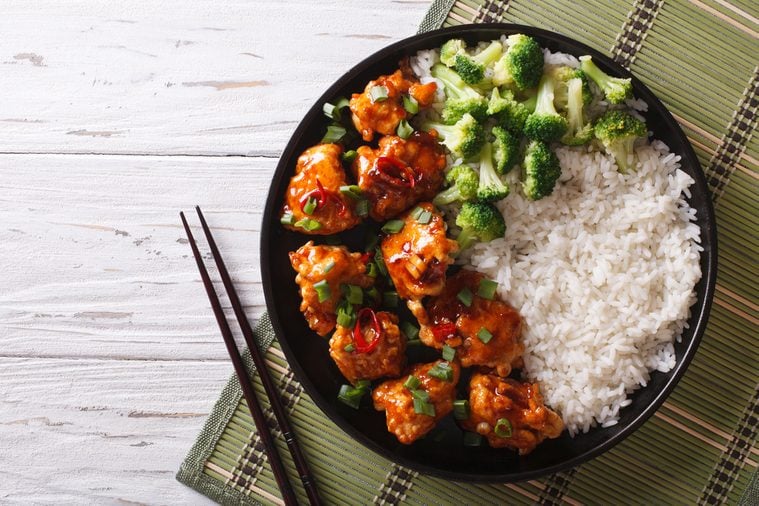
General Tso’s chicken
This dish is a favorite among restaurant food trends, according to food delivery giant GrubHub, reports NBC News. Well, fans of the dish may want to take a closer look at what they’re eating. An average order as listed in USDA Food Database delivers over 1,500 calories, 87 grams of fat (of which around 15 grams are saturated fat), 62 grams of sugar, and a day’s worth of sodium at 2,327 milligrams. Because it contains the three main nutrients the US Dietary Guidelines consider health risks, this is a dish worth skipping. Here are the healthiest Chinese take-out options.
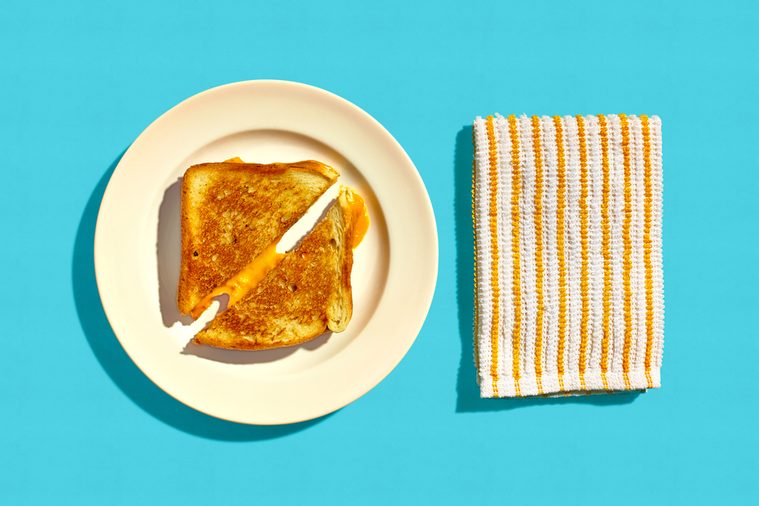
American cheese
Pasteurized, processed cheese food has been around for over 100 years, according to its first manufacturer, Kraft. Its “meltability” has made American cheese a favorite in grilled cheese sandwiches and macaroni and cheese, but the product clocks in at about 100 calories per ounce and up to 350 mg sodium, depending on the brand. The ingredient list is not clean, featuring emulsifiers, thickeners, artificial colors, and flavors. If you’re going to enjoy cheese, opt for high-quality hard cheese such as Parmigiano Reggiano, which has bold flavor and actual nutrients in its cleaner ingredient list. If you’re lactose-intolerant, try these 11 smart dairy alternatives.
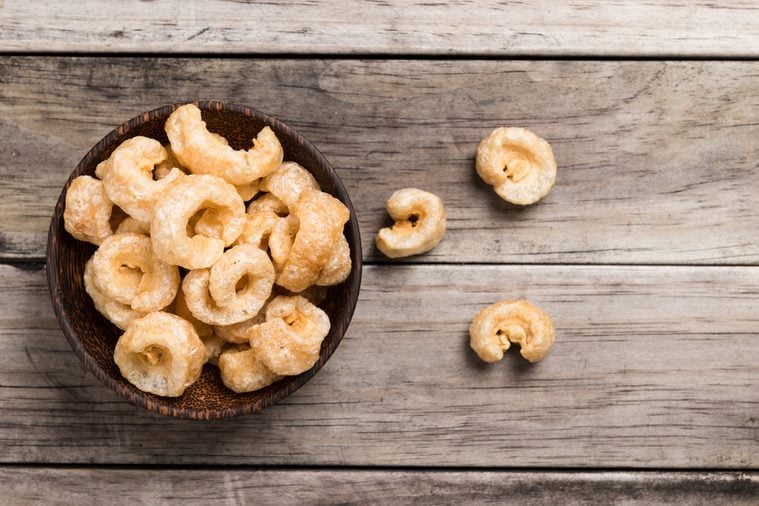
Pork rinds
These tasty crunchy morsels do contain protein, but they’re also fatty and highly processed. The USDA Food Database says the average half ounce serving (about 7 to 9 pieces, depending on size) provides more than 10 percent of the daily sodium requirement. And at 2 grams of saturated fat, a serving clocks in at about 80 calories. A study of eating trends in the Journal Nutrients indicates that snacking contributes about 500 calories to the average person’s intake. Not surprisingly, US Dietary Guidelines show the snack category provides the lowest percent of nutrients compared to other meals. Choose nuts and seeds for a healthier snack option—these are the healthiest nuts you can eat.
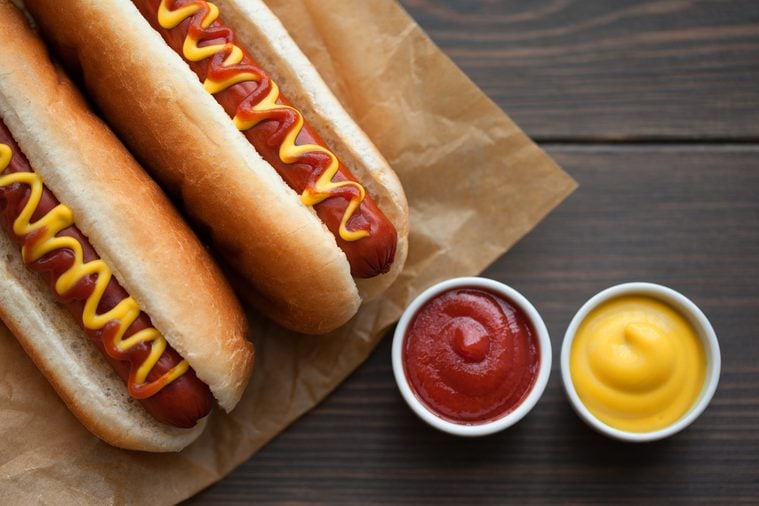
Processed meat
A 2018 research study in the European Journal of Cancer suggests that intake of processed meat is associated with an increased risk of breast cancer. Full of fat, nitrates, and salt, processed meats such as hot dogs, salami, bacon, and deli meats have been linked to several cancers, earning them a place on the American Cancer Society’s list of foods to limit to reduce cancer risk. An occasional splurge is okay, but it shouldn’t be an everyday habit. Here are 37 ways to cut your cancer risk.
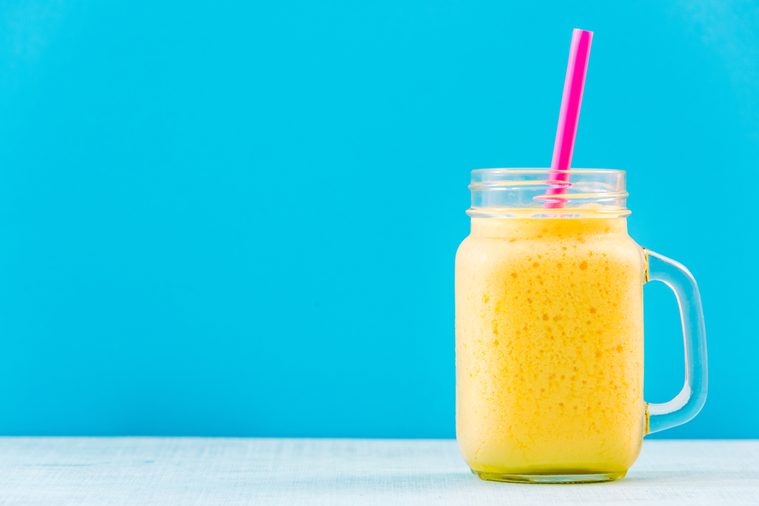
Fruit smoothies
Although smoothies can be made of healthy ingredients like fruits and vegetables, they can also be a concentrated source of calories that are sucked down quickly without giving your body time to register that it’s actually “eaten” something. Liquids don’t register in the brain the same way solids do, according to a research study in the American Journal of Clinical Nutrition. An analysis of studies in the Journal Physiology and Behavior concluded that the act of chewing stimulates gut hormones that impact appetite and satiety. Eat one of these 10 healthy fruits for your body instead.
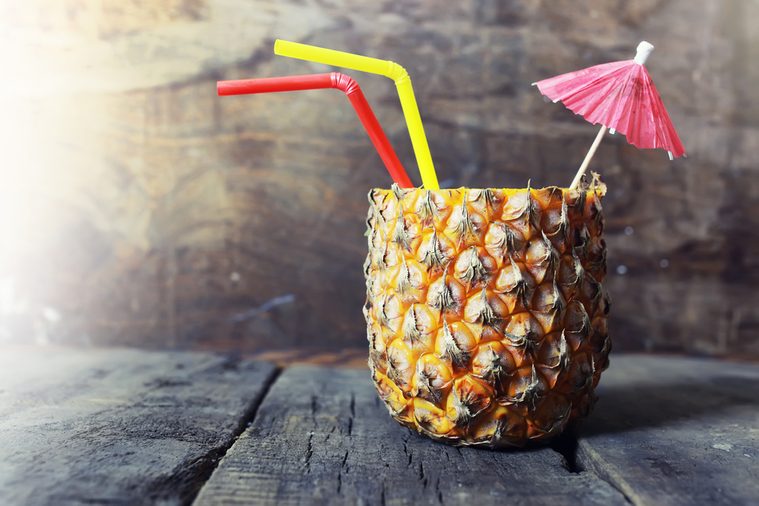
Piña colada
Many love this sweet cocktail that combines rum, coconut cream, and pineapple juice, but according to the USDA Food Database, an average 6-ounce pina colada will cost you around 325 calories and 42 grams of sugar, and that’s not a great choice for anyone watching their waistline. For one-third the calories you could have a rum and diet cola. For even fewer calories, give these festive mocktail recipes with zero alcohol a try.
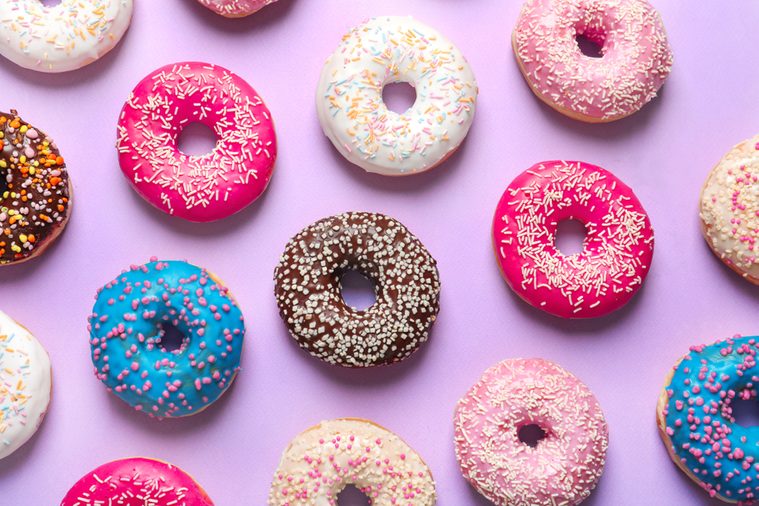
Doughnuts
Doughnuts come in many varieties, so naturally the nutritional content varies, but according to Sandra Arévalo, MPH, RDN, CDN, spokesperson for the Academy of Nutrition and Dietetics, none are a good choice—you’re looking at anywhere from 150 to 350 calories. “To burn 300 calories you would need to jog for about 30 minutes,” she says. “Most doughnuts contain about 12 grams of sugar (about 3 teaspoons) and are also high in saturated fat, providing a third of the recommended daily intake.” Despite their dismal nutrition, Americans love them. Approximately 192 million of us ate doughnuts in 2017, according to data compiled by Statista. You might find a satisfying substitute in these 21 healthier versions of your favorite junk food.
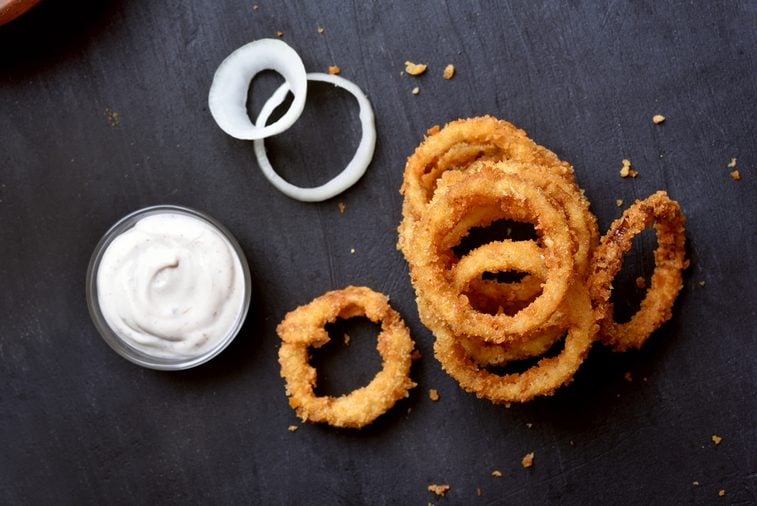
Onion rings
Yes, they’re delicious, but they should never be a regular part of anyone’s diet. “A portion of eight onion rings provides almost 300 calories, and to burn these calories you would need to walk for 45 minutes,” Arévalo says. Although onion rings have some calcium and iron, the high content of sodium and saturated fat offsets any benefits. “Dipping them in sauce or gravy can add another 150 calories, plus more fat and sugar, such that a portion of onion rings with gravy provides half the recommended dietary intake of fat for the day,” Arévalo adds. Instead, try these 10 healthy fast food options.